Coronavirus Pandemic Responses – Conflict Transformation – Development – Humanitarian Activities. Support and solidarity needed!
Covid-19
Eastern Africa’s Covid-19 caseload is based on limited testing and data. The presence of the Covid-19 pandemic-threat prompts the demand for continued implementation of preventive measures. This is especially true in rural and slum areas where adherence to the containment guidelines has remained a challenge. Through Shalom-SCCRR, 29 health facilities (Health centers, clinics and dispensaries) and two orphanages have received substantial assistance, and specialized training provided to personnel from a large number of other medical centers (details below). Shalom-SCCRR’s Covid-19 pandemic intervention has been based on the understanding that urgent humanitarian support, conflict transformation and development interventions are essential for the emerging needs of the marginalized communities at this time.
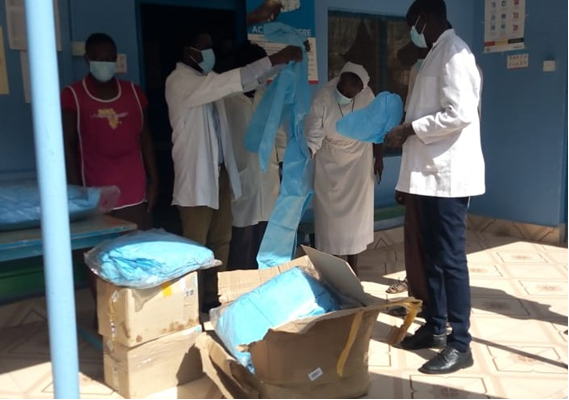
Development and Preventive Interventions
Alongside putting major focus on prevention against the spread of Covid-19, Shalom has initiated a total of 32 school/development projects consisting of classrooms, desks, chairs, tables, boarding facilities (Bed and Mattresses), textbooks, solar lighting and laboratory equipment, etc. Since the onset of Covid-19 in Eastern Africa, Shalom-SCCRR has also been busy working towards improving the level of preparedness for the resumption of schools, particularly those in the poverty-stricken, marginalized, and impoverished rural villages of the Northern Kenya and in the urban slums.
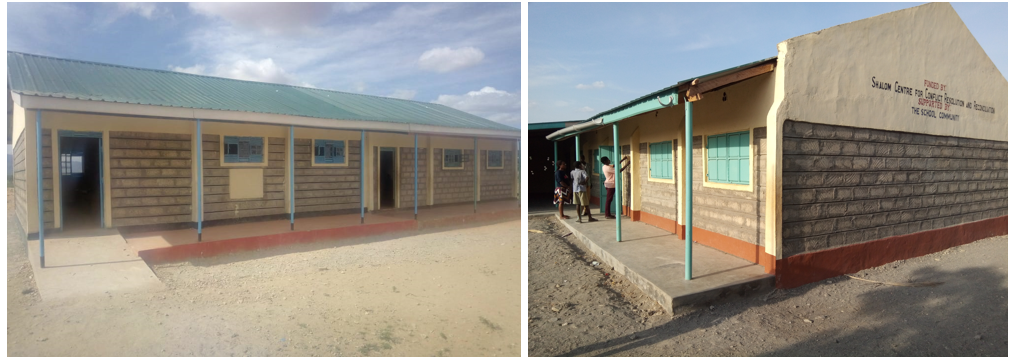
Seven of the ongoing 32 projects are particularly focused on the construction of classrooms. Availability of more classrooms, seats, sleeping items and learning equipment within the context of Covid-19 pandemic will assist in social distancing. This initiative will guarantee the safety of more children and teachers within the learning environment. This interventions will in turn help safeguard vulnerable families and communities at large.
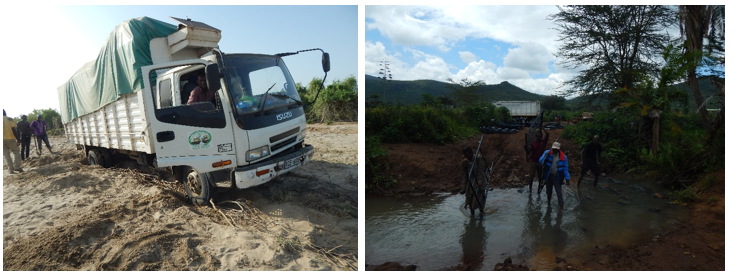
Provision of Personal Protective Equipment (PPE) & supplies
Shalom-SCCRR focus has been fixed on supporting health facilities and community members to remain safe from infections even as they go about their day to day activities. So far, Shalom-SCCRR has supported 29 health facilities (Health centers, clinics and dispensaries) with hygiene and Personal Protective Equipment (PPEs) comprising of body gowns, face shields, face masks, gloves, sanitizers and hand washing soap. Shalom has funded training to a wide range of medical personnel working in a large number of medical institutions in the remotes areas of north western Kenya – an area the size of Ireland!
Shalom-SCCRR continues to take the initiative of supplying masks and hygiene products such as sanitizers and soap to remote and impoverished rural areas and urban slums. This has particularly targeted poverty stricken families, front line health care workers, community health volunteers, aid workers and orphaned children’s homes.
The protective and hygiene equipment that has been provided by Shalom to 2 orphaned children’s homes in Nairobi and Marsabit counties has been helpful in scaling up the hygiene and safety levels among the children especially at this time of restricted movement. Shalom continues to monitor the needs of children in the poor, marginalized and impoverished rural and urban settlements particularly in these 2 orphaned children’s homes so as to ensure maximum protection for these vulnerable children.
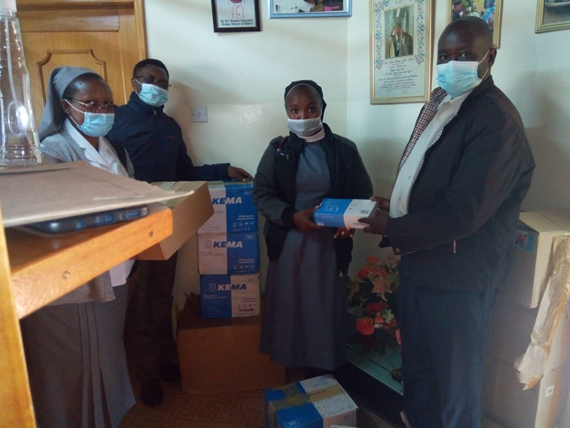
Moreover, women members of Shalom-SCCRR groups in the urban settlements continues to take the initiative of sewing and distributing face masks to individuals within their neighborhoods in order to slow the spread of the virus in these rather crowded environments. Individual members of Shalom-SCCRR groups especially in the urban informal settlements, have also been involved in manufacturing of home-based hand-washing soap for distribution and use at homes and in public toilets.
Community awareness and mobilization
Shalom-SCCRR influencers – mainly chiefs, religious leaders, village elders, women, youth/warriors leaders and Community Health Volunteers – have remained actively involved in collaboration efforts with local government leaders and sub-county government officials in the fight against coronavirus.
Shalom-SCCRR has mobilized its resource people particularly community facilitators and peace group leaders to boost awareness about the virus and techniques of preventing its spread. This has been activated through door-to-door community awareness initiatives and organized forums particularly those that are organized by local government administrators.
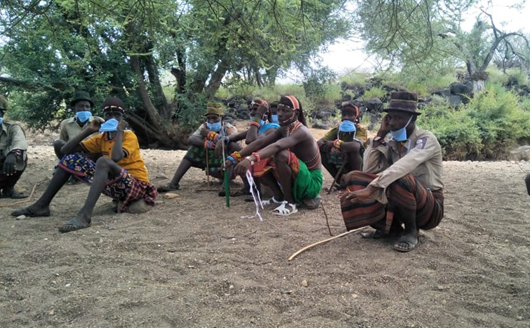
North Kenyan community members have praised youth leaders in Shalom-SCCRR groups for reaching out to traditional warriors in the villages, and supporting translation activities for health officers while delivering the health related messages to communities.
The continuity of the awareness creation forums remains vital to these traditional communities given the need for constant reminders and monitoring of communities’ adherence to the laid down preventive measures.
Conflict Response
SCCRR has remained steadfast in responding to the concerns and constant invitations by community beneficiaries for continued interventions to the conflict, pandemic and development needs. The non-physical engagements that Shalom has kept with community members has created an opportunity for sharing of skills which have been instrumental in the prevention of Covid-19 and other related conflicts. The present resumption of the physical engagements with the communities is an even greater opportunity to curb the potential security threats that the communities might face especially as a result of the Covid-19 pandemic.
Looking to the future with faith, hope and a passion for compassion!
The fragility of the livelihoods of the tribal communities that live in Shalom-SCCRR project areas has a negative bearing on the recovery of these communities following the ravaging effects of the coronavirus. Soaring levels of deprivation, increased property theft, and heightened competition over available resources will likely destabilize established inter-ethnic relations and freeze the opportunities for personal and societal development.
Through Shalom-SCCRR’s conflict intervention methodology, the team has put in place a spirited effort to constantly monitor how the pandemic is impacting relationships among ethnic groups in the Northern Kenya and informal urban environments. The goal is to organize communities to mitigate circumstances that could escalate into deadly conflicts, safeguard the threatened inter-ethnic cohesion, and to strengthen the mutual concern for the well-being and development of one another.
Shalom-SCCRR’s peacebuilding and development support has never been so critically needed as in this moment of crisis for humanity. Please donate if at all possible!
God Bless you all
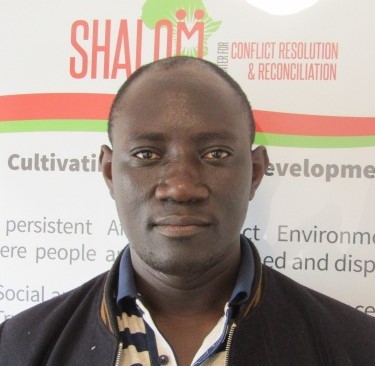
By Godfrey Okoth, MA, Shalom-SCCRR Director of Programs
CC. Fr. Oliver Noonan, MA, Executive Director, Shalom-SCCRR, Kenya
Rev. Dr. Patrick Devine, Chairman, Shalom-SCCRR, Kenya

